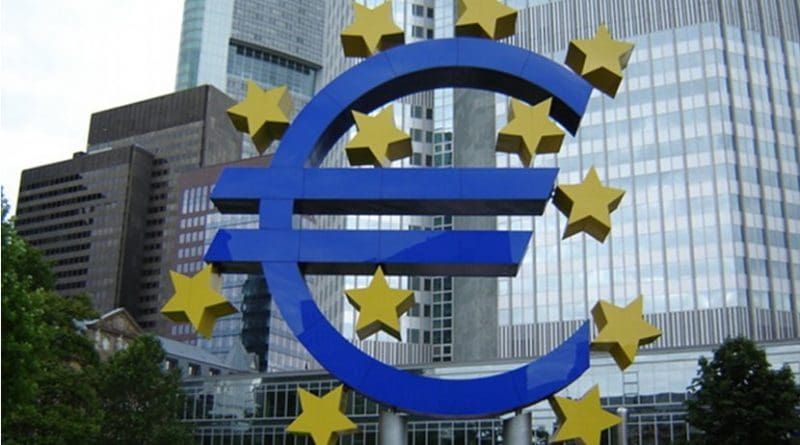Recession Fears Grow As Euro Area Inflation Hits Three-Year Low
By EurActiv
By Beatriz Rios
(EurActiv) — Inflation in the euro area fell to 1% in July, its lowest level since 2016, according to Eurostat data released on Monday (19 August), adding pressure on the European Central Bank to consider relaunching its economic stimulus programme in September.
Inflation in the eurozone fell by more than one point compared to the same period last year (2.2%), sliding further away from the ECB target of 2%.
The latest Eurostat forecast published last week also showed that while GDP keeps growing, it only rose by 0.2% in the second quarter of 2019.
Germany, the eurozone’s economic powerhouse, could soon enter a recession, the Bundesbank said in a note published on Monday (19 August).
“International trade disputes and Brexit are important reasons behind this,” said Germany’s central banker Jens Weidmann, describing the slowdown as a slump.
The euro area also suffered from the “softening global growth dynamics and weak international trade,” ECB President Mario Draghi explained during a press conference back in July.
No decision before September
Draghi’s comments, in such a context, were widely interpreted as an open door for the ECB to relaunch its bond-buying programme. After the ECB’s governing council meeting in July, all options were on the table to boost the euro area economy.
The ECB will make a decision in September, based on the latest forecast. But some of its members are already making public comments to prepare the ground.
Estonia’s central bank governor, Madis Müller, said in an article that as inflation in the eurozone slides further away from EBC target, the bank “has yet to stimulate the economy.”
In an interview with the Wall Street Journal a few days ago, Finland’s Central Bank governor Olli Rehn said that “substantial and sufficient” bond purchases as well as interest rate cuts might be needed. The ECB kept its main interest rate at zero in July.
“It’s important that we come up with a significant and impactful policy package in September,” Rehn said.
Draghi said the ECB has been considering monetary stimulus for several months “to ensure that financial conditions remain very favourable and support the euro area expansion.”
If the situation does not improve, “the Governing Council is determined to act,” the ECB President insisted. Draghi will be replaced in October by Christine Lagarde, the former head of the International Monetary Fund.
Bond-buying policy
The ECB launched in March 2015 a public sector asset purchase programme in secondary markets (PSPP). Under this programme, the ECB bought public bonds on secondary markets to stimulate growth and counter deflation in the eurozone.
The scheme was suspended in December 2018, days only after the ECB won a landmark case at the European Court of Justice. The tribunal backed the programme by confirming it fell within the mandate of the ECB and was the lender’s last resort to counter deflation.
Draghi might make use of that trump card again in September.

